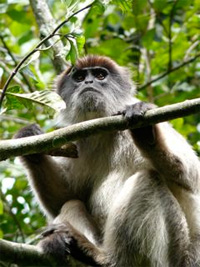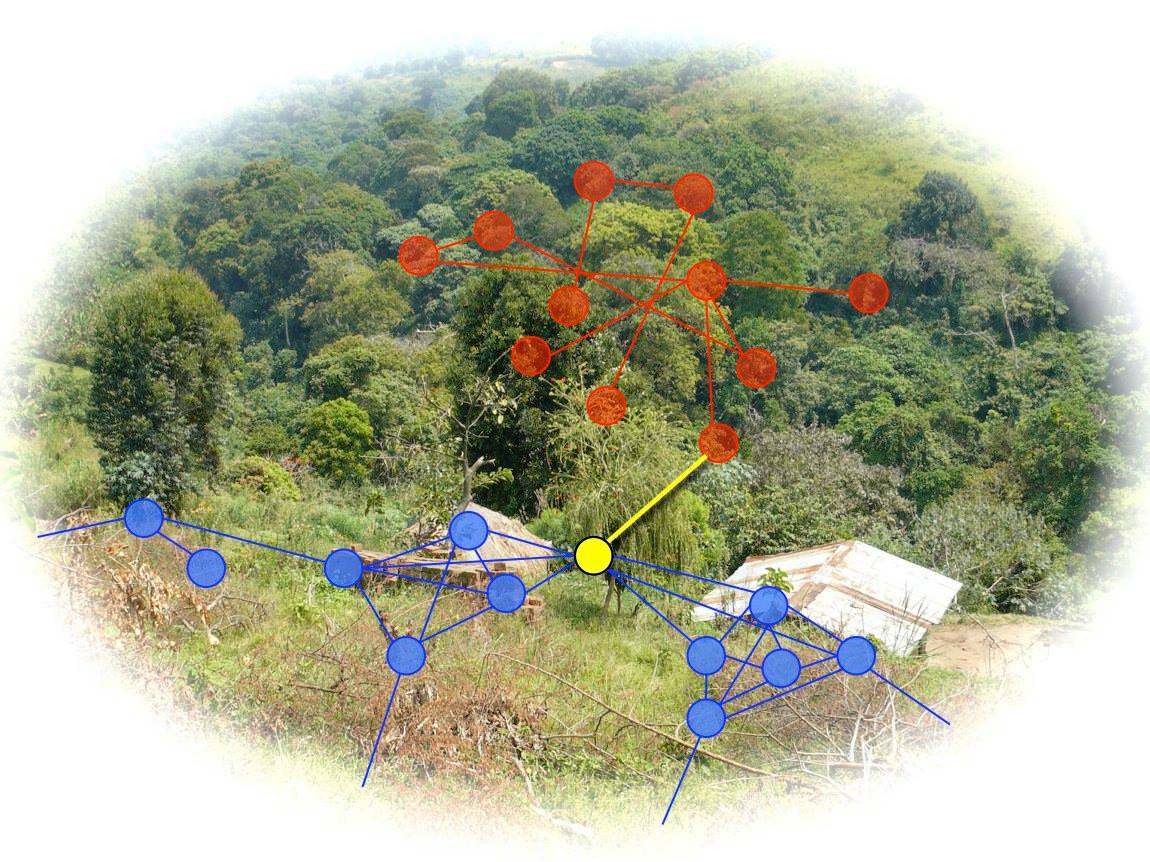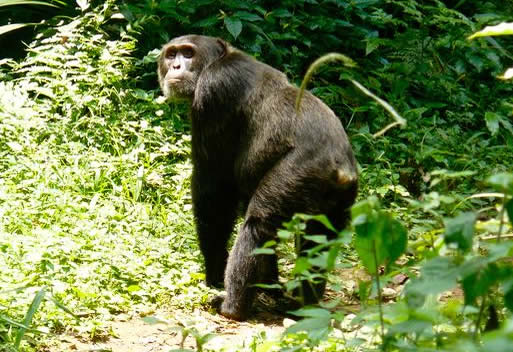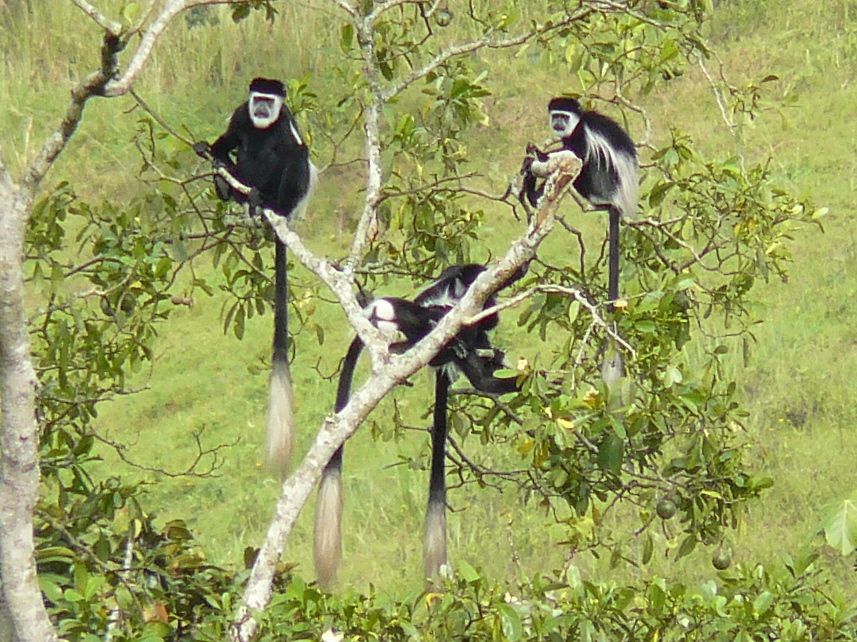RESEARCH
 Research in the Kibale EcoHealth Project is designed to investigte how anthropogenic changes to ecosystems alter health-related outcomes for people, domestic animals, and wildlife. Studies take place in and near Kibale National Park, western Uganda. This region is a "hot spot" for human-animal interaction and zoonotic disease emergence, due to its fast rate of population growth, high human disease burden (e.g. malaria, AIDS), and exceptional biodiversity. Our research includes studies of wild non-human primates, which are famously diverse and abundant in Kibale. However, we also study other mammals (e.g bats), other vertebrates (e.g. frogs) and invertebrates (e.g. arthropods). Our activities combine the biological and social sciences, drawing on disciplines such as epidemiology, molecular biology, virology, behavioral ecology, anthropology, demography, and disease modeling to answer complex questions about disease transmission, health, and their root drivers.
Research in the Kibale EcoHealth Project is designed to investigte how anthropogenic changes to ecosystems alter health-related outcomes for people, domestic animals, and wildlife. Studies take place in and near Kibale National Park, western Uganda. This region is a "hot spot" for human-animal interaction and zoonotic disease emergence, due to its fast rate of population growth, high human disease burden (e.g. malaria, AIDS), and exceptional biodiversity. Our research includes studies of wild non-human primates, which are famously diverse and abundant in Kibale. However, we also study other mammals (e.g bats), other vertebrates (e.g. frogs) and invertebrates (e.g. arthropods). Our activities combine the biological and social sciences, drawing on disciplines such as epidemiology, molecular biology, virology, behavioral ecology, anthropology, demography, and disease modeling to answer complex questions about disease transmission, health, and their root drivers.
Some of our specific research projects include:
Biological and human dimensions of pathogen transmission
 This project examines multiple pathogens (viruses, bacteria, eukaryotic parasites), focusing on the dynamics of transmission within and between species, including humans. The project has a strong social science component, focusing on human social factors that affect viral transmission between animlas and people. Combining data from the biological and social sciences, the research sheds light on ecological pathways of transmission while also identifying how human knowledge, beliefs, and behaviors might enable diseases to “jump” between species and spread.
This project examines multiple pathogens (viruses, bacteria, eukaryotic parasites), focusing on the dynamics of transmission within and between species, including humans. The project has a strong social science component, focusing on human social factors that affect viral transmission between animlas and people. Combining data from the biological and social sciences, the research sheds light on ecological pathways of transmission while also identifying how human knowledge, beliefs, and behaviors might enable diseases to “jump” between species and spread.
Biodemography of aging in chimpanzees
 This project compares the agiing process in humans and chimpanzees, in an effort to understand similarities and differences in aging between the species. The project focses on factors that shape
senescence. These include infectious diseases, sex differences, allocation of reproductive effort across the life history, stability of access to energy, and social status and
support. The study is the first to gather comprehensive
data on aging in wild chimpanzees, whose health has not been manipulated by humans during captive management or
biomedical experimentation.
This project compares the agiing process in humans and chimpanzees, in an effort to understand similarities and differences in aging between the species. The project focses on factors that shape
senescence. These include infectious diseases, sex differences, allocation of reproductive effort across the life history, stability of access to energy, and social status and
support. The study is the first to gather comprehensive
data on aging in wild chimpanzees, whose health has not been manipulated by humans during captive management or
biomedical experimentation.
Animal health at the wildlife-livestock interface
This project examines the health of livestock at the border of Kibale National Park, where interactions with wildlife are intense due to such factors as crop raiding and forest clearing. Using veterinary health assessments and quantitiative measures of interaction between domestic and wild animals, we hope to identify factors that affect livestock health and productivity.
Phylogenetic and ecological influences on the primate microbiome
 This project examines the diversity and composition of microbial communities (all microbes, including viruses, bacteria and eukaryotes) in wildlife, people, and livestock. Because these species overlap extensively in their use of habitat, we can examine the influence of phylogeny and physiology on the composition and function of microbial communities with ecology held relatively constant. We can also examine how habitat variation influences microbial communities by studying animal populations in habitats that range from pristine forest to highly degraded forest fragments.
This project examines the diversity and composition of microbial communities (all microbes, including viruses, bacteria and eukaryotes) in wildlife, people, and livestock. Because these species overlap extensively in their use of habitat, we can examine the influence of phylogeny and physiology on the composition and function of microbial communities with ecology held relatively constant. We can also examine how habitat variation influences microbial communities by studying animal populations in habitats that range from pristine forest to highly degraded forest fragments.
Pathogen and pathway discovery
This project examines novel pathogens using "next generation" sequencing technologies. We are discovering new and potentially zoonotic pathogens, including DNA viruses, RNA viruses, bacteria, helminths, and protozoa. Because only a small proportion of pathogens in nature are known, this project has the potential to identify important infectious agents before they jump to new species. The project uses methods from the social sciences to explore the pathways by which known and unknown pathogens might enter the human population.
